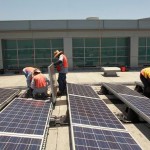Fundamental Resources for our survival:
Last week we understood that “dynamic equilibrium allows survival possibilities to exist for each species, according to how they manage the distribution of available resources for their survival”. Today, I wanted to talk about which are the resources that require an excellent human management; and next week we will try and think a way of how to manage them for real.
(The awareness newsletters number 89, 90, 91 and 92 are pretty much interconnected, and are based on the readings I made on the Zeitgeist Movement Activist Orientation Guide, written by Peter Joseph, Part 2: What is relevant? Chapter 3: Natural Law.)
According to Joseph, we can divide our fundamental resources for survival in this planet into 3 categories:
1) ENERGY.
2) INDUSTRIAL/TECHNOLOGICAL RAW MATERIALS.
3) FOOD PRODUCTION, AIR AND WATER SUPPLY.

1) Regarding energy, the issue is boarded in its whole by renewable energies. Because the fact that they are renewable means they exist in abundance. And, as we talked last week, scarcity of resources lowers the supply, increasing the demand and you sell better than last year, and there has been progress…
The only reason we think that energy is scarce is because it implies a substantial lass of profit for the monetary system. That is way we get desperate when the price of the oil goes up and up, or when coal and gas keep on running out… We no longer need to depend on fossil fuels which the planet took so long to bury beneath our soil.

A quick glance to the statistics provided by Joseph when he speaks about the benefits of wind, wave, solar and geothermal power, leaves you wondering on why society never demanded that our energetic matrix would be structured in a sustainable way…
a) THE WIND: Only 20% of the planetary wind potential covers all the energetic needs of the world;
b) THE WAVES: 50% of our annual world energetic consumption can be covered with the energy of the waves and tides of the hydrosphere, our rivers, lakes, seas and oceans;
c) THE SUN: the solar radiation that hits the surface of the Earth each year is 10.000 times our own annual energetic usage;
d) THE HEAT OF THE EARTH: The geothermal energy has an electric generation potential of 13.000 zettajoules (our annual consumption is of only 0,5 zettajoules per year, this is, 4.000 years of planetary electricity supply).

Hence, energy is nothing but abundant in this planet, it depends on us putting our mind at work in finding ways of enhancing our methods of harvesting and storing our renewable energy, as well as demanding them in a governmental level…
2) In order to understand how to extract industrial/technological raw materials efficiently, we must understand the carrying capacity of our planet. In order to do so, we must:
I. Know our resources: Which are they? Where? How much? Lots of new environmental careers are appearing with the true objective of getting to know the ecosystem, in order to take advantage of the carrying capacity of our planet efficiently.
II. Find substitutions for those materials which are really scarce by promoting investigation. For example, hemp wood for housing constructions instead of chopping down our forests; a new type of car wash that uses a cleaning system based on carbon dioxide instead of pure water; reusing our cotton bags for the supermarket, instead of using plastic ones; etc.
III. Understand and change how society organizes the usage of those materials at his disposal. This is the most important point, because it brings 2 mayor issues: 1. COMPETITION: competition within the economic market makes companies seek for reducing their costs to sell better, more and in less time, in exchange for heavy alienated work, disproportionate extraction and mad waste production; 2. PSYCHOLOGY: We are the ones who buy anything and believe what we are told, a brand, a band, a football team, a car, a life.
3) Food production and air and water preservation are seriously at risk by our beloved system. The thing is that reducing waste or giving them the right treatment is very expensive, hence, reduces profit and, once again, we are like we are today, everything contaminated.
“The starving children of the world are not so because of lack of available food. It is their lack of purchasing power, not true scarcity, which causes needless deaths of millions a year.” – Peter Joseph.
Until next week,
Brian Longstaff.-

















Leave a Comment